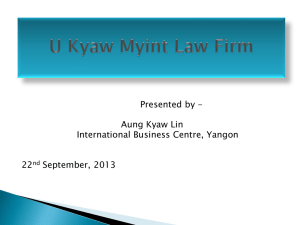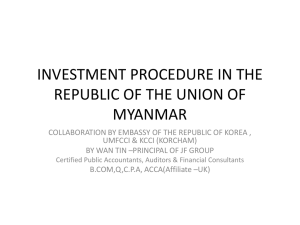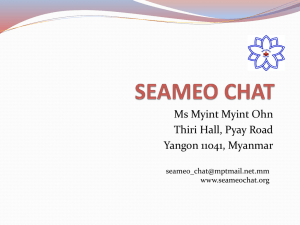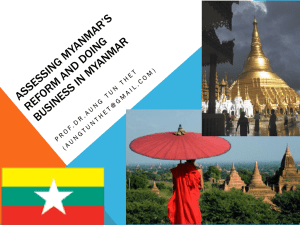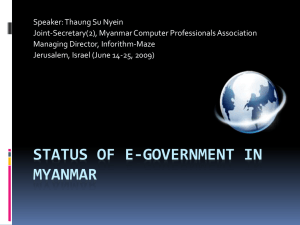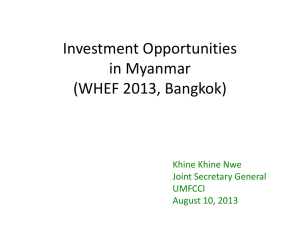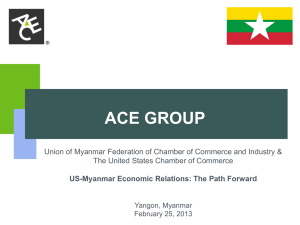Telecoms Law - Charltons Myanmar
advertisement
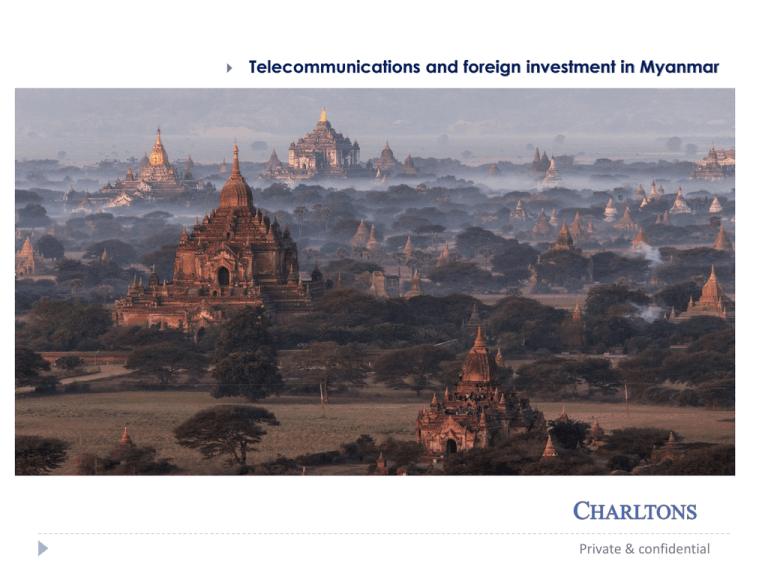
Telecommunications and foreign investment in Myanmar Private & confidential Part 1 Telecommunications in Myanmar 1 Telecommunications in Myanmar Extremely low mobile, fixed line and internet penetration Positioned for robust growth Government of Myanmar (Government) aims to increase mobile penetration from 3% to 75% from 2011 – 2016 Various combinations of fixed and mobile technologies can be employed – strategy focusing on mobile internet access may be preferable to the development of a fixed broadband network Myanmar requires thousands of kilometers of fiber infrastructure and in excess of 15,000 towers to be constructed to meet stated targets at an estimated coast of approximately US$4 billion* New Telecommunications Law enacted October 2014 *Source – Deloitte “Myanmar: The Next Asian telecommunications greenfield?” 2 Telecommunications in Myanmar (Cont’d) Prior to 2013 foreign companies were prohibited from providing telecommunications services in Myanmar 2013 mobile licence tender process – winners Telenor (Norway) and Ooredoo (Kuwait) Government needs to implement a comprehensive set of regulatory policies increasing the quality and levels of telecommunications services while keeping user costs low Need for regulation to balance private sector’s incentives with the Governments objectives Myanmar’s has the benefit of being able to study the development of the telecommunications sectors in other countries Different needs in rural (2G/3G, 4G or wireless broadband, satellite broadband) and suburban areas (3G/4G wireless broadband – suburban adoption may be faster due to infrastructure and affordability; fixed wire broadband) 3 Myanmar Telecommunications Law 2013 (Telecoms Law) Telecoms Law repeals the antiquated Myanmar Telegraph Act 1885 and Myanmar Wireless Telegraphy Act 1934 Some transitional provisions under the Telecoms Law - existing licences are presumed to have been issued under the Telecoms Law up to the date of expiry of the licence Implementing regulations expected in 2014 Objectives of the Telecoms Law • • • • • support the modernisation and development of the State by means of telecommunications technology providing equal opportunities and transparent competition between local and foreign entities to establish a telecommunication network with nationwide coverage protect telecommunications service providers, that establish and operate businesses, as well as users to supervise telecommunications services, network facilities and licensed telecommunications equipment being used 4 Telecoms Law (Cont’d) Main governmental bodies identified in Telecoms Law: 1. Department of Telecommunications (Department) 2. Ministry of Communications and Information Technology (Ministry) 3. National Telecommunications Advisory Committee (Committee) 4. Appeals Tribunal 5 Principle functions of the Department The Department is the executive arm in relation to telecoms regulatory matters, and is responsible for the following:- • • • • • • • issuing and renewing licences; assigning frequency spectrum; implementing the national numbering plan and electronic addressing plan; approving tariffs schemes and set consumer protection standards; Prescribing rules for access and interconnection; assisting licensees in relation to the installation of network facilities where necessary; and determining conditions, codes of practice and standards and issue orders and directions. The Department is empowered to:1. take administrative action against a licensee if the licensee is found to have breached the Telecoms Law or failed to comply with licence conditions (Chapter 26) 2. resolve disputes among licensees in relation to the operation and provision of telecommunications services or network facilities or access and interconnection (Chapter 14) 6 Principle functions of the Ministry 1. The Ministry is the policy and strategy formulating body for the telecoms sector 2. The Ministry supervises the Department. 3. Ministry approval is required for a number of functions performed by the Department. (i.e. prosecutions under the Telecoms Law) 4. The Ministry will also determine licence fees, renewal fees, spectrum fees, fees for the allocation of numbers in accordance with the use of numbering and electronic addressing plans and amounts for overdue payment of those fees. 5. The Ministry may issue rules, regulations and by-laws with the approval of the Government and notifications, orders, directives and procedures, as necessary, for implementing the Telecoms Law. 6. If a licensee is dissatisfied with a dispute resolution decision of the Department, it may appeal to the Ministry and then to the Appeals Tribunal 7 Principle functions of the Committee and Appeals Tribunal The Committee The principle function of the Committee is to make recommendations and suggestions concerning technical standards, consumer protection and telecommunications development policy and related issues. The Committee may be chaired by the Union Minister of the Ministry or any designated person and will comprise sector representatives, licensees, consumer groups, industry experts and the Department The Appeals Tribunal On the advice of the Ministry an Appeals Tribunal can be established to handle licensee appeals against the administrative actions of the Ministry. Decisions of the Appeals Tribunal will be final and binding. The term of the Appeals Tribunal commences on the date of formation and ends on submission of the final decision report to the Government. 8 Telecoms Law: State’s right to suspend licences • The Ministry, or the department or organisation assigned by it, may, in respect of defence and security matters of the State or public interest, enter into the premises of the licensees to inspect, supervise, and may request the licensees to furnish any relevant documents. (S. 76) • In cases of public emergency, the Ministry order a licencee to suspend a telecommunications service. The Ministry can further restrict specific forms of communication, jam or intercept any communication, hand over telecommunications equipment, or take temporary control of any telecommunications equipment. (S.77) • A licencee must take measures to prevent any interference to the State’s security (S. 18 (b)) • A licencee is also required to indemnify the State against any breaches or failures on the part of the licencee (S.15 (e)) 9 Telecoms Law: Licences The Telecoms Law provides for four categories of licence (three Telecommunications Services Licences (Chapter III) and a Telecommunications equipment licence (Chapter IV)):- 1.Network facilities licence - Owning network facilities, leasing owned network facilities to another licensee or providing telecommunication services using owned network facilities 2.Network service licence - Carrying information by means of telecommunications, excluding services provided solely on the customer side of the network boundary 3.Application service licence - Providing a service using one or more network service, excluding services provided solely on the customer side of the network boundary 4.Telecommunications equipment licence Possessing or using telecommunications equipment deemed by the Ministry as requiring a licence, other than telecommunications equipment for use or provided by a licensee •Facilities and services licences have a minimum 5 – 20 years •Equipment licences will be for a term to be prescribed in the licence. 10 Telecoms Law: Land Licensees need to obtain the prior agreement of the owner of any land or building where network facilities are installed, connected or used that, in case of any change of ownership of the land or building, the network facilities can continue to be installed, connected or used. Pursuant to Section 48 (a) – (c) the Department has the power to give directions in relation to land access where: 1. the cooperation of developers or owners of buildings is required to provide space for the installation of network facilities within or on the building or land, within a suitable time frame; 2. a licensee is required to install network facilities within a specified period; or 3. a licencee is required to contribute wholly or partly to the costs and expenses incurred in installing network facilities. 11 Telecoms Law: Miscellaneous Provisions Shared network or services • Government approval is required where a licencee wishes to enter into an agreement with another licensee for access or interconnection to network facilities or services (S.33) • Access and interconnection must be on an equitable and non-discriminatory basis and must not be of lower technical standard and quality than for the licensee’s own network facilities or services (S. 34) Universal target (service) • The Department, may set universal service targets and universal service obligations for licensees (S. 56 b) Competition • Licensees are prohibited from entering into any understanding, agreement, arrangement or contract for the purposes of unilaterally affecting rates, market sharing to reduce other competitors, preventing buying from a specific supplier or vendor of telecommunications equipment or unfair competition against competitors. • Licensees are also prohibited from restricting customers from acquiring telecommunications equipment or services from that licensee or from any other person. 12 Telecoms Law: Miscellaneous Provisions (Cont’d) Price regulation and promotion of competition • Department is empowered to determine the consumer protection standards that will apply to service licences (S.17) • Licencees are required to submit a schedule of tariffs to be introduced in respect of any telecommunications service to the Ministry (S. 18) • The Telecoms Law contains a general provision against eliminating free competition in the communications market (S.35) • The Telecoms Law also prohibits anti-competitive behaviour such as price fixing and cartel formation (S.36) Confidentiality • Licencees must keep confidential the information transmitted or received via telecommunications services, and not disclose such information to any unauthorised or irrelevant person except as required by law. (S.17) 13 Telecoms Law: Miscellaneous Provisions (Cont’d) Price regulation and promotion of competition • Department is empowered to determine the consumer protection standards that will apply to service licences (S.17) • Licencees are required to submit a schedule of tariffs to be introduced in respect of any telecommunications service to the Ministry (S. 18) • The Telecoms Law contains a general provision against eliminating free competition in the communications market (S.35) • The Telecoms Law also prohibits anti-competitive behaviour such as price fixing and cartel formation (S.36) Confidentiality • Licencees must keep confidential the information transmitted or received via telecommunications services, and not disclose such information to any unauthorised or irrelevant person except as required by law. (S.17) 14 Part 2 – Myanmar Foreign Investment Law 15 Foreign Investment Law 2012 FIL replaced foreign investment legislation enacted in 1988 (1988 FIL) The government separately introduced implementing rules (Investment Rules) on 31 January 2013 Under the FIL foreign investors can benefit from significant tax exemptions and other benefits Myanmar Investment Commission (MIC) established Directorate of Investment and Company Administration (DICA) serves as the Secretariat of MIC The FIL applies to three forms of foreign investment ○ 100% foreign owned companies ○ Joint ventures with a local investor or the state ○ Investments carried out through contractual relationships with local investors Government and MIC approval is required for foreign investment in the telecoms sector 16 FIL: Objectives Infrastructure development (transport, telecommunications, electricity) Development of natural resources Regional development Development of a modern banking and financial services sector Employment creation Environmental protection Skills and technology transfer Promote education Promote exports Development of domestic manufacturing 17 FIL: Incentives Guarantee against expropriation/nationalisation Guaranteed remittance of profits; remittance upon exiting the investment Equity in an FIL company can be transferred with the approval of the MIC Foreigners are permitted to lease land for up to 50 years as well as two continuous extensions of 10 years if approved by the MIC MIC may allow for longer land lease periods for investments in remote and less developed areas of the country 18 FIL: Tax Incentives A 5-year tax holiday that may be extended Tax exemption for re-invested profits Accelerated depreciation on capital assets Tax relief on income tax up to 50% on profits from exports Tax deductions for research and development Exemptions from customs duties on capital assets to be used in the business imported during construction period Exemption from customs duties on raw materials imported during first 3 years of production A deduction for expat salaries at normal rates Relief on customs duties on imports for expansion of the business Exemption from commercial tax for exports 19 Investment Rules Investment Rules implement the FIL Investment Rules comprised of two Notifications:- ○ Notification 1/2013 sets out the permitted activities for foreign investors and the activities which require a joint venture ○ Notification 11/2013 sets out various regulations and procedural information in relation to investment licences Notification 1/2013 divides economic activities into four categories. These are:○ Prohibited economic activities ○ Activities permitted to be conducted as joint ventures between foreigners and Myanmar nationals ○ Restricted activities permitted under certain conditions or requiring approval ○ Activities only permitted following the completion of an Environmental Impact Assessment 20 Investment Rules (cont’d) Highlights:○ Investment Rules are not applicable to trading activities ○ The investor must submit a schedule of investment if the proposal provides that the investment will be made over a period of time ○ Investors are required to submit a progress report to the MIC every 90 days ○ If an extension is needed for the construction period, the investor must apply to the MIC at least 60 days before expiration of the construction period ○ Investor can sub-lease or mortgage a long lease on application to the MIC ○ Shares in an FIL-approved company, whether owned by a foreigner or a Myanmar national, may be transferred to a foreigner or a Myanmar national with MIC approval ○ Disputes must be settled by reference to Myanmar’s Arbitration Act 1944 and the Protocol and Conventions Act 1939 ○ All economic organisations formed under an MIC permit shall effect insurance with any authorized local insurance enterprise in respect of the followings types of insurance:– (a) machinery insurance; (b) fire insurance; (c) marine insurance; (d) physical injury insurance; (e) natural disaster insurance; (f) life insurance 21 Investment Rules: Prohibited Economic Activities Prohibited economic activities (reserved for Myanmar citizens) include:○ A number of small and medium production, agricultural, fishing and livestock, activities, activities relating to traditional foods, medicines and cultural items ○ Small and medium sized mineral production activities ○ Drilling of shallow oil wells up to the depth of 1,000 feet ○ Generation of electricity under 10 megawatt ○ Construction of health care centres for the elderly Activities only permitted following the completion of an Environmental Impact Assessment ○ Oil and gas exploration ○ Hydroelectric power ○ Mining 100% foreign ownership is permitted for the vast majority of business activities 22 Investment Rules: Restricted Economic Activities The list of economic activities in which foreigners can engage under certain restrictions is wideranging and is sub-divided according to the Ministry responsible for the relevant restricted activity. Restrictions include:○ ○ Restriction on level of foreign ownership, including:- A limitation of between 25% and 49% placed on foreign ownership of entities engaged in various activities related to forestry and timber - A limitation of 70% placed on foreign ownership of entities engaged in the production and distribution of paint and certain chemicals A cap on the duration of permits for:- Large scale mining projects (15 years, with possible renewals for 4 x 5 years) - Pearl production (15 years, with possible renewals for 2 x 5 years) - Production and distribution of certain chemicals 23 Investment Rules: Restricted Economic Activities (cont’d) The list of economic activities in which foreigners can engage under certain restrictions is wideranging and is sub-divided according to the Ministry responsible for the relevant restricted activity. Restrictions include:- (cont’d) ○ Certain activities can now only be conducted in cooperation with the government. These include:- Jewellery production and sales - Production and distribution of explosive chemicals, specified substances and vaccines - Marine training, representing foreign shipping companies, operation of shipyards, domestic water transport and specified construction work related to transportation 24 Investment Rules: Joint Ventures Pursuant to the Investment Rules, foreign participation in 42 categories of economic activity must be conducted via joint ventures (JVs) with a local partner. These include:○ Large scale exploitation and production of minerals ○ Production / distribution of seeds, certain foodstuffs ○ Paper manufacturing ○ Pharmaceuticals manufacturing ○ Plastics manufacturing ○ Packaging manufacturing ○ Certain construction and real estate development projects ○ Tourism services Foreign capital should not exceed 80% of the total capital of JV companies engaged in economic activities which are prohibited or restricted The foreign to domestic ownership ratio for joint ventures in activities that are not restricted or prohibited is subject to agreement between the parties The MIC has the power under the FIL to prescribe minimum foreign ownership requirements on a case-by-case basis 25 Myanmar Investment Commission (MIC) The MIC is the approving authority for foreign investment activity. The MIC:○ evaluates foreign investment proposals ○ stipulates the terms and conditions of investment permits ○ evaluates proposals for completeness and accept/reject proposals within 15 days of submission of application ○ issues (or denies) an investment permit within 90 days If the proposed investment is in the natural resources sector, the relevant ministry (i.e. Mines or Energy) submits the application to the MIC on behalf of the foreign investor 26 Applying for an MIC Permit MIC permit application process:○ Application to MIC ○ Application considered by MIC officials ○ Meeting of Proposal Assessment Team ○ Government comments ○ MIC meeting ○ MIC instructs Companies Registration Office (CRO) to issue credit advice in relation to remittance of capital ○ MIC permit issued 27 Applying for an MIC Permit (cont’d) The information required by the MIC includes the following:○ the name of promoter or investor, proof of citizenship, address, place of business, effective place of headquarters, place of incorporation, type of business ○ if investment is to be made through a JV, particulars relating to the JV partner (plus supporting evidence such as copies of company incorporation documents) / if partnership then a draft partnership agreement should be provided ○ particulars relating to production or services activities in which investment is to be made ○ the intended term of investment, the period of construction, volume of goods to be produced ○ location of investment ○ information on technical aspects of the investment including plant and machinery ○ type and amount of energy required ○ type of land required 28 FIL (MIC) Investment Process Stage 1 Submit an investment proposal to MIC MIC scrutinizes the proposal MIC issues the MIC permit Stage 2 Stage 3 Apply to DICA for a “permit to trade” (PTT) Apply for company registration with CRO Remit 50% of minimum capital into Myanmar before the issue of the initial PTT (remaining 50% to be remitted within one year) CRO approves the company registration application CRO issues a certificate of incorporation DICA issues the permit to trade 29 MCA Investment Process: Permit to Trade Foreign companies must obtain a “Permit to Trade” (PTT) under the Section 27A of the MCA before it can carry on or continue its business in Myanmar PTT issued by DICA The application for a PTT must be accompanied by the following documents:○ Required particulars entered in Form A of the Myanmar Companies Regulation, 1957 ○ Drafts of the company's memorandum and articles of association or equivalent constitutional documents ○ Duly completed questionnaire form prescribed by the Capital Structure Committee of the Ministry of National Planning and Economic Development ○ List of economic activities intended to be performed in Myanmar (and permission from the relevant Ministry if any) ○ Estimated expenditures to be incurred in Myanmar for the first year of the operation 30 Permit to Trade (cont’d) In the case of a foreign branch the following must also be furnished:○ Instead of drafts of the memorandum and articles of association, a copy of the foreign company’s memorandum and articles of association or other constitutional documents notarised by the Myanmar Embassy concerned in the country where the company is incorporated ○ Copies of the foreign company’s balance sheet and profit and loss accounts for the last two financial years ○ Where the memorandum and articles of association and equivalent documents are not in English in the original, authentication of the translation into English DICA will issue the PTT after considering the recommendation of the Capital Structure Committee 31 MCA Investment process Stage 1 Stage 2 Stage 3 Propose 3 names to CRO Apply to DICA for a PTT Apply for company registration with CRO Receive CRO approval Remit 50% of minimum capital into Myanmar before the issue of the initial PTT (remaining 50% to be remitted within one year) CRO approves the company registration application CRO issues a certificate of incorporation DICA issues the PTT 32 Branch and Representative Offices Branch ○ Applications to DICA ○ Local office of a foreign company ○ No local ownership ○ No limited liability ○ Often used as starter entity to commence operations ○ Can lease an office and hire local employees Representative Office ○ Banks and insurance companies only ○ Applications to DICA ○ Liaison activities only ○ Joint ventures to be permitted in the near future 33 Comparison of Filing and Tax Obligations Company Branch Office Rep Office US$2,500 US$2,500 US$2,500 Annual tax return? Yes Yes Yes Annual corporate filings? Yes No No Tax (after FIL tax holiday) 25% 25% (Under FIL) Not income earning . Filing Fees 35% (under MCA) Tax status Resident foreigner Non-resident foreigner Non-resident foreigner 34 Share Capital Requirements Under FIL* Under MCA Services company US$300,000 US$50,000 Industrial /Manufacturing company US$500,000 US$150,000 *50% to be remitted prior to issuance of the PTT and 50% within 12 months 35 Tax No VAT system in Myanmar Commercial Tax is imposed on a wide range of goods, imported into or produced in Myanmar, trading sales, and services The rates of Commercial Tax are set out in various schedules to the Commercial Tax Law introduced on 31 March 1990 Imports - Commercial Tax is collected by the Myanmar Customs Department at the point of importation in the same manner that customs duties are collected The Government has indicated that it intends to replace the current Commercial Tax regime with a VAT or GST based model. It is anticipated the new model will be introduced by 2018 - 2019 Myanmar has double taxation agreements with the U.K., Singapore, India, Malaysia, Vietnam, Laos, Indonesia and South Korea 36 Tax (Cont’d) Royalties ○ Dividends ○ Royalties paid for the use of licences, trademarks, patent rights, etc. are taxed at a rate of 15% for residents (Myanmar citizens and resident foreigners) and at 20% for non-resident foreigners There is no withholding tax or income tax on dividends in Myanmar Losses ○ Losses from any source may be set off against income accruing from any other sources in that year, except for capital losses or a share of loss from an association of persons. Unutilised losses may be carried forward and offset against income in the following three years. Capital losses and a share of loss from an association of persons may not be set off against income from other sources or carried forward. Such losses may be set off only against capital gains derived in the same year 37 Tax (Cont’d) Company/Income Rate(s) Companies incorporated under MCA 25% Companies operating under FIL 25% Foreign organisations engaged under special permission in State-sponsored projects, enterprises or undertakings 25% Branch companies 35% Capital gains - Resident companies - Non-resident companies - Oil and gas companies 10 % 40 % 40% - 50%* *The rate of capital gains tax on the transfer of shares in oil and gas companies increases with the amount of net profit earned on the transfer. The rates are:- 40% (net profit is less than US$100m) 45% (net profit is between US$100m – US$150m) 50% (where net profit exceeds US$150m) Tax returns on capital assets must be filed within 1 month from the date of disposition or transfer. 38 Property Foreigners not permitted to own property in Myanmar MIC must consent to foreigners leasing land MIC has the right to require the lease to be terminated in certain circumstances i.e. failure to pay rent or environmental damage Foreigners cannot enter into leases for land that are in excess of 50 years. MIC can agree to an extension of the term by two periods of 10 years, i.e. to a total of 70 years. Leases of immovable property require registration if they last over one year or have yearly rent Leases are not granted for religious land; land restricted for state security; land under litigation; and land restricted by the state 39 Property (cont’d) At present demand for modern commercial and residential property in Yangon is strong whereas supply is limited Mortgage market yet to develop Yangon’s housing stock comprised primarily of apartments / condominiums Design and build quality of many condominiums/apartments remains poor Complimentary infrastructure/amenities also remain underdeveloped Opportunities exist to develop modern serviced apartments and commercial centers and tourist/hospitality orientated real estate projects 40 Special Economic Zones (SEZs) Legal framework: Myanmar Special Economic Zone Law and Dawei Special Economic Zone Law 2011. (Revised law expected. Many incentives offered in the 2011 laws were incorporated into the FIL. It is anticipated that the revised SEZ law will include additional incentives) Currently three SEZs under development in Myanmar:Dawei SEZ ○ Southern Taninthayi region ○ Proposed multi-billion dollar port ○ Significant Japanese and Thai investment ○ Longer tenure for large scale industry (up to 75 years) Thilawa SEZ ○ Southern Yangon ○ Initially funded by low interest loans from Japan Kyuakpyu SEZ ○ Ramree Island (western coast of Myanmar) ○ Will be hole to an oil and gas terminal financed by the China National Petroleum Corporation ○ First phase expected to be completed in 2016 41 Foreign Exchange Controls Gradual liberalisation of foreign exchange controls:○ April 2012: “Managed floating exchange rate” introduced (old “official rate” of 6 Kyat per 1US$) ○ August 2012 Foreign Exchange Management Law Introduced ○ FIL allows for remittance of foreign currency through authorised banks ○ March 2013: Kyat becomes directly exchangeable against Renminbi and Bhat. Foreign Exchange Certificate system abolished ○ August 2013: “ Free float exchange rate” to be introduced ○ Further anti money laundering measures to meet international standards ○ In practice, the remittance of foreign currency into Myanmar remains problematic as transactions continue to be affected by the remaining sanctions against Myanmar and an underdeveloped financial services sector 42 Procedure for Repatriation of Profits Notification no. 40/2011 and the Investment Rules regulate the use of foreign currencies in investments under the FIL. Remittance of profits and capital repatriation are subject to prior approval of MIC and are also subject to Foreign Exchange Regulations The required supporting documentation includes:○ Central Bank of Myanmar (CBM) application form ○ Audited financial statements ○ Bank balance certificate ○ Tax clearance certificate ○ Directors’ resolution authorising payment of dividend ○ Auditor’s certificate certifying capital/loan principal ○ Auditor’s certificate certifying interest details ○ Documentation evidencing remittance of capital or loan into Myanmar ○ CBM approval 43 Employment Issues No consolidated employment law – numerous acts containing provisions relating to employment and workers’ rights Local staff must have contracts approved in form by the Ministry of Labour, Employment and Social Security Minimum wage set by sector by minimum wage committee The FIL contains provisions intended to increase the use and skills of local Myanmar employees All unskilled positions should be filed by Myanmar citizens In relation to skilled positions, Myanmar nationals must account for the following percentages of an FIL incorporated company’s workforce:○ At least 25% during the first two years ○ At least 50% during the second two years ○ At least 75% during the third two years 44 Corporate Matters Directors ○ The minimum number of directors of a private company and a public company in Myanmar is two and seven respectively. ○ The MCA requires a return of particulars of directors, managers and managing agents and any changes of such particulars to be lodged with the DICA no later than 14 days after the relevant appointment or changes ○ Directors can be foreign or local Allotment of shares ○ Every company allotting shares is required to file a return of the allotments within one month of the date of allotment, stating the number of nominal amount of the shares comprised in the allotment, the information of the allottees and the amount (if any) paid or due and payable on each share 45 Corporate Matters (cont’d) Annual General Meeting (AGM) and filing of annual return ○ Every Myanmar incorporated company must hold an AGM once in every calendar year laying its audited documents before its shareholders ○ A newly incorporated company is required to hold its first AGM within 18 months of incorporation. Subsequent AGMs must be held once in every calendar year and not more than 15 months after the last general meeting ○ Within 21 days after an AGM has taken place, all companies are required to file an annual return together with annual audited accounts ○ Every Myanmar incorporated company is required to lodge a copy of every extraordinary and special resolution certified by an officer of the company with the DICA no later than 15 days from the date of passing of the resolution ○ The MCA requires every Myanmar incorporated company to maintain proper books of accounts which have to be kept at the registered office of the company 46
